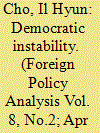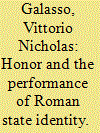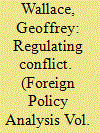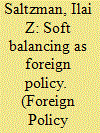|
|
|
Sort Order |
|
|
|
Items / Page
|
|
|
|
|
|
|
| Srl | Item |
| 1 |
ID:
111924


|
|
|
|
|
| Publication |
2012.
|
| Summary/Abstract |
During his tenure, President George W. Bush touted the East Asian democratic experience as a positive model for democratization in the Middle East. Contrary to the premise of democracy leading to regional stability, however, East Asian democracies in the past decade have often become a source of regional instability. Based on a comparative analysis of political developments in Taiwan, Japan, and South Korea, this paper explores the foreign policy behavior of East Asian democracies and assesses the overall impact on regional security dynamics. Specifically, I argue that incomplete democratic consolidation, combined with the political salience of national identity, sparked a process of acute intergroup competition among domestic political actors. As a result, the foreign policy orientation of the three East Asian democracies became belligerent, thereby unnecessarily increasing regional tensions.
|
|
|
|
|
|
|
|
|
|
|
|
|
|
|
|
| 2 |
ID:
111923


|
|
|
|
|
| Publication |
2012.
|
| Summary/Abstract |
Are the personal identities of elite decision makers a domestic source of state identity? This article explores this question and reveals how state identity was produced in the Roman world system during the early Principate.† The argument advanced proposes the Roman world was ensconced by a metavalue of honor that significantly shaped the personal identities of Rome's aristocratic decision-making classes. Competition for honor subsumed aristocratic life and shaped not only the personal identities of the elite, but also the persona of the Roman state. The Romans extrapolated their psychological framework, in which the stratification of domestic society rested on personal identities of honor, to their outlook on foreign policy. Akin to their domestic lives, those executing foreign policy conceptualized Rome as engaged in a status competition for honor with the polities existing its world system. Preserving and enhancing one's honor relative to others was fundamental in domestic life, and this was also the state's primary objective in relation to all others. The identity of the Roman state, therefore, was an aggressive status seeker.
|
|
|
|
|
|
|
|
|
|
|
|
|
|
|
|
| 3 |
ID:
111920


|
|
|
|
|
| Publication |
2012.
|
| Summary/Abstract |
A great deal of foreign policy analysis relies on social and environmental factors, or anecdotal evidence. In seeking to address this problem in a more systematic manner, we move from an investigation centered around state actors to one focused on variation in individual behavior account for the combination of social, cultural, environmental, psychological, and biological differences. Our proposed approach to the study of political violence requires the integration of methods and skills from geneticists and neuroscientists with those in the behavioral and social sciences. Specifically, we seek to introduce an approach to study political violence which : (i) quantifies the effects of genes, environments, and their interaction on behavior; (ii) identifies specific genetic and environmental contexts that lead to such behavior; (iii) develops a comprehensive model of the biological and social pathways to political violence; (iv) identifies populations under specific circumstances which pose a higher or lower prevalence for any specific genes, neurobiological or environmental mechanisms which pose an increased liability for political violence; (v) develops mechanisms to identify individuals within given populations who are most at risk for committing violence, as well as those most resistant to such action; and (vi) creates environmental responses which can mitigate risk among those individuals.
|
|
|
|
|
|
|
|
|
|
|
|
|
|
|
|
| 4 |
ID:
111922


|
|
|
|
|
| Publication |
2012.
|
| Summary/Abstract |
The ongoing War on Terror and the rise of nonstate actors in armed conflicts around the world have led both critics and proponents of international law to argue the Geneva Conventions currently governing warfare are no longer relevant. Yet what are the prospects for a new Geneva Convention to take hold in the international community? In order to begin to address this issue, I examine the factors influencing the decision of states to commit to the existing laws of war. Using an event history analysis of the ratification of the 1949 Geneva Conventions and 1977 Additional Protocols I and II, I find formative events involving past experience with war, as well as several other domestic and external factors, shape the incentives to commit to international law. In particular, far from pushing war-torn states to join international agreements in the hopes of mitigating the costs of armed conflict, the legacy of war makes states less willing to be constrained by international humanitarian law. The findings have implications for the role of formative events on incentives for international cooperation and foreshadow that the path toward widespread acceptance of any new Geneva Convention, should one ever be negotiated, would likely be formidable.
|
|
|
|
|
|
|
|
|
|
|
|
|
|
|
|
| 5 |
ID:
111921


|
|
|
|
|
| Publication |
2012.
|
| Summary/Abstract |
In an attempt to increase the legitimacy and traction of soft balancing in contemporary International Relations (IR) scholarship, and in order to rebuff critiques of its applicability, the concept is further clarified and applied to examine American foreign policy vis-à-vis Japan in the interwar period. Analysis reveals that soft balancing is not only a legitimate explanation, but also explains a major historical and theoretical puzzle-American grand strategy vis-à-vis Japan in interwar period-it shows that the concept is also applicable to account for patterns in non-unipolar systems.
|
|
|
|
|
|
|
|
|
|
|
|
|
|
|
|
|
|
|
|
|